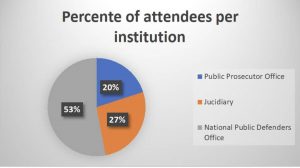The Program to Support Argentina’s Criminal Procedure Reform and Strengthen the Transition to the Accusatory System, which has the technical support and funding of the International Narcotics and Law Enforcement (INL) agency of the U.S. Embassy in Argentina, has been developed to provide technical assistance in the implementation of Argentina’s New Federal Criminal Procedure Code, through the development of studies and training for operators of the federal justice system.
Within this framework, in June 2023, the closing activities of the project were carried out through talks in the provinces of Salta, Mendoza and Santa Fe, in addition to the International Seminar “Challenges in the criminal prosecution and trial of organized crime” held at the Law School of the University of Buenos Aires.
The discussions were attended by operators of the criminal justice system who have been part of the implementation of the project. Judges, prosecutors and public defenders from the cities of Salta, Jujuy, Mendoza, San Luis, San Juan, Rosario and Santa Fe attended. The JSCA team and representatives of the INL agency, Jérémie Swinnen and Sol Osuna also participated.



The objective of the activities was to gather experiences and evaluate the development of the Program and the processes of implementing the adversarial system in Argentina’s criminal justice system. First, JSCA gave a presentation on the results and impacts of the Project, highlighting the 25 seminars that were held with more than 1,000 attendees; the publication of two collective works and a manual of case studies; the 31 courses that were held with a total of 1,229 participants; and two study trips (Washington and Santiago, Chile) in which justice operators from the selected provinces participated. Afterwards, the participants were invited to share their experiences in the development of the program and the implementation of the adversarial system in Argentina.

At this stage, many comments were expressed by the attendees. Among them was the need to continue with the training program, especially in the area of oral litigation, and the dynamism of the new system demands that tools continue to be added for the proper performance of the functions of each of the participants.
In this regard, the participants indicated that the training provided by JSCA provides them with a theoretical or technical framework for their discussions. Regarding the need to continue to improve their skills, they emphasized that the different hearings of the new process set different litigation guidelines. It is therefore necessary to train on how each of the different hearings works within the framework of the adversarial model.

On the other hand, the attendees expressed the need to move towards reforms of the sentence execution process. They identified as a problem the overload of work of the judges who must be in charge of both the oral trial stage and the execution process. The implementation of the new system brought with it greater speed in the process and, therefore, more sentences in less time. This means that those judges in charge of the execution process increased their number of hearings considerably.
In addition, the need to strengthen the management of the number of cases and hearings brought about by the new process was mentioned. The adversarial system generates new roles and functions that must be assumed by the operators, so that the workload of those involved varies, in this context, it is necessary to accompany the reform with an efficient management plan to cope with this new form of work of the criminal justice system.

Finally, it should be noted that in the jurisdiction of Salta it has been 4 years since the implementation of the adversarial system. In this context, justice system officials stressed the need to advance in the implementation of the new system in the rest of the country. Due to the virtues of the adversarial model, among them its dynamism and publicity, they do not see a return to the inquisitorial system as a viable option.
They also highlighted JSCA’s work in the implementation of the adversarial system. They emphasized that the accompaniment provided over the past four years was essential for the establishment of the system, as it allowed them to learn about international experiences and empirical evidence on the functioning of the adversarial system and to understand in detail the progress being made in its implementation. Special emphasis was placed on the role played by the simulated hearings and training provided, which were elemental when it came to approaching their work in the new model. The constant training, they said, helped them to successfully cope with the new dynamics of hearings focused on orality.
